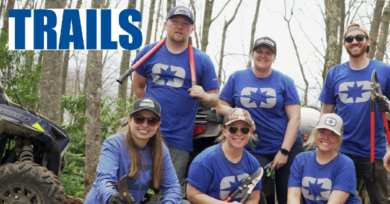FOCUS – Legislation Shapes Powersports Activities
Springtime warmth brings riding season to many parts of the country dormant for months beneath a layer of winter snow. While motorcycle and ATV owners charge batteries, change oil, clean filters and buy new tires, lawmakers across the country are debating issues sure to affect powersports recreation.
The New York Department of Environmental Conservation (DEC) currently is seeking comments on a proposed policy for allowing ATVs on public land.
There currently is limited access for the vehicles on state land. The policy is intended to set up a series of criteria and requirements that DEC will use when assessing the appropriateness of ATV access on DEC lands, said a spokesman for the state agency.
Officials are holding nine meeting around the state to assemble information for a final policy that will set criteria for land managers in determining where the vehicles would be appropriate.
According to a prepared statement from the Department of Environmental Conservation, the proposed policy would ensure all-terrain vehicle access to state land conforms with the state Vehicle and Traffic Law, the Environmental Conservation Law, agency rules and regulations and the Adirondack and Catskill state land master plans; would not facilitate trespassing on private land; and would not cause environmental degradation.
Copies of the proposal are available on the Department of Environmental Conservation’s Web site, www.dec.state.ny.us.
In other New York OHV news, Governor Pataki has proposed funds for development of ATV trail systems consistent with the ATV policy that is being developed. Online information about the Trail Fund and ATV/OHM Trails Program can be found at www.nysorva.org/Legislative_Action.shtml.
In New Jersey, the National Off-Highway Vehicle Conservation Council and American Motorcyclist Association recently sponsored a two-day “OHV Association Development Workshop” and “Ride Into Political Action” seminar.
Twenty-seven OHV enthusiasts attended the event to build the Jersey Off-Highway Vehicle Association. The proposed mission of the association is to advocate safety, environmental, conservation and land ethics education; serve as a communication network; and work to protect, promote, and enhance responsible and quality OHV recreation opportunity.
A one-day incorporation meeting was held in Bordentown. The agenda will include approval of the association name, mission, by-laws, election of officers and recommendation on the association’s one-year and five-year goals. Goodfellows Motosport, the Jersey Devil ATV Riders Association, X-treme Habitat, Pine Barrens Motorcycle Club and Meteor Motorcycle Club each donated $100.00 to fund the association through the incorporation meeting.
Those interested in the Jersey OHV Association are asked to contact Dennis Farmer, 732/506-6595, or Larry Osusky, 201/945-2959.
Lawmakers in Arkansas are set to debate House Bill 2048, concerning approval of motor vehicle racing facilities.
The bill amends a section of state code concerning construction of and permits for motor vehicle racing facilities. It has been amended to read: Due to the noise, air pollution, and traffic congestion caused by motor vehicle racing facilities, no motor vehicle racing facility may be constructed in this state after passage of this act without the consent of at least seventy-five percent (75%) of the property owners and seventy-five percent (75%) of the adult residents registered voters within three (3) miles of the outside boundary of the proposed facility and without an annual permit issued by the Arkansas Department of Environmental Quality.
Ohio Gov. Bob Taft’s budget proposes to raise state revenue by adding or increasing about 50 fees, including the registration fee for dirtbikes and ATVs. Registration of all vehicles is required to ride at any of the state or federally managed OHV areas in Ohio. The three-year registration fee would be increased from $5 to $15. The fee revenue would be deposited into the State Recreational Vehicle Fund, which is only to be used for motorized trail purposes.
In eastern Kentucky, Harlan County received a $50,000 grant from the Federal Highway Administration’s recreational trails program after local leaders developed a plan to produce OHV routes out of roads that wind around steep ridges and mountaintops on former mining land.
The grant will be used to develop a trailhead and recreational vehicle parking area in Evarts, the coal town closest to the mountaintop mines that are home to most of the off-road activities.
Tennessee’s Senate Finance Committee recently considered two OHV bills, one that would impose a $50 fine on all-terrain vehicle operators who ride their vehicles on private land without obtaining the property owner’s permission, and the other that requires children under 16 to complete a safety course before riding ATVs.
The two bills already were approved by the Senate Transportation Committee.
Allen Gebhardt, assistant director of the Tennessee Wildlife Resources Agency (TWRA), asked the Senate Transportation Committee to defer any bills dealing with OHVs to allow TWRA to study the issue and present a comprehensive bill next year. TWRA is looking into expanding its budget to hire a person who would examine what the state needs to do to regulate OHVs.
It is estimated that approximately 350,000 OHVs are currently operated in Tennessee.
In Pennsylvania, the Marienville Ranger District recently sought public comment on a proposal for an ATV trail connector from the Timberline ATV Trail into Russell City in Elk County.
To provide access for goods and services from the ATV Trail to Russell City, the proposed action would allow access to 0.6 miles of Forest Road and 800 feet of an existing non-system road currently used by the oil and gas industry.
Proponents of the proposal say it will help meet public demand for camping near the ATV trail, and keep public land free of encumbrances.
The decision to be made is whether the environment related to the proposed action warrants consideration via a formal assessment. The public comment period closed April 12.
Vermont House bill 421, introduced by Representatives Richard Hube, Jr. (R-Londonderry) and Richard J. Marek (D-Newfane), would require “an organized motor vehicle event” to be permitted by the “legislative body of the affected municipality.” Failure to comply with the permitting requirement would result in a fine of up to $1,000 plus “reasonable costs incurred by the town as a result of the violation.”
Observers note that this bill would make it easier for local politicians to stop recreational motorcycle events in places like Jamaica, which inappropriately stopped a dual-sport ride before it began last summer.
Even though the Vermont Attorney General’s Office took issue with many of the steps taken by Jamaica’s Board of Selectmen and local law enforcement officers to stop the Red Fox Turkey Run last year, the bill’s opponents say HB 421 would give even greater discretion to local politicians.
A spokesperson for the American Motorcyclist Association (AMA) said HB 421 defines an “organized motor vehicle event” so broadly that any group of seven or more motorcyclists would be required to get a permit to access town roads.
In other news from Vermont, the Green Mountain National Forest has just released for public comment a revised management plan for the 400,000 acre forest.
The plan stems from an effort to develop policy governing ATV access in the state through an ATV Collaborative Group convened by Governor James Douglas.
One of the group’s recommendations was to create ATV corridors on public lands to link to private ATV trail networks. The plan would permit the creation of ATV corridors as links between ATV trail systems located off Forest Service land, as well as creating additional wilderness areas.
Public comment period on the draft management plan ends July 5.
Across the country, a Federal Court in San Francisco has issued an injunction prohibiting OHV use in wash zones within 571,000 acres of public lands in the Northern and Eastern region of the California desert to protect the threatened desert tortoise.
The order, issued Dec. 30, 2004, partially grants a motion filed by the Center for Biological Diversity, the Sierra Club, and others alleging violations of the Endangered Species Act.
The areas affected are public lands administered by the Bureau of Land Management (BLM) within designated desert wildlife management areas (DWMAs) in Imperial, Riverside and San Bernardino counties. The BLM says the public still has OHV access to more than 1,700 miles of designated open routes within the 1.7 milion acres of the two DWMAs — Chemehuevi and Chuckwalla).
In Montana, the State is seeking trail recreationists to serve on an OHV Advisory committee that meets twice a year. The committee advises the agency on distribution of $160,000 of OHV Trails Program funds and various trails-related issues.
“We’re looking for three new committee members with broad recreational trail backgrounds and particular interests in ATV and dirtbike riding to ensure the committee is balanced and represents a range of perspectives,” said Ray Paige, a program specialist for the State’s Motorized Trails program. Volunteers will serve three-year terms. Applications must be received by May 15.
The OHV Advisory Committee is made up of five delegates, appointed by the director of Montana Fish Wildlife and Parks (FWP), representing trail-users interests including ATV and motorcycling. Other committee participants include representatives of the U. S. Forest Service, Bureau of Land Management and FWP.
For more information, contact the Montana Fish, Wildlife & Parks, State Trails Program, PO Box 200701, Helena, Mont. 59620-0701; 406/444-7317; rpaige@mt.gov.
Further south in the Rocky Mountains, the BLM Royal Gorge Field Office in Canon City, Colorado, closed public lands in southwestern Huerfano County, forbidding all types of motorized travel although there is no existing legal motorized public access to the land. The BLM says approximately 4,600 acres were closed “to prevent the development of unauthorized user-created trails, damage to soils and vegetation, adverse impacts to water quality, and wildlife harassment.”
Finally, in Texas, Rep. Fred Brown (R-College Station) presented House bill 565 to require ATVs sold after January 1, 2006, to be equipped with “an overhead roll bar”. The required roll bar would have to comply with standards to be developed by the Department of Public Safety.




